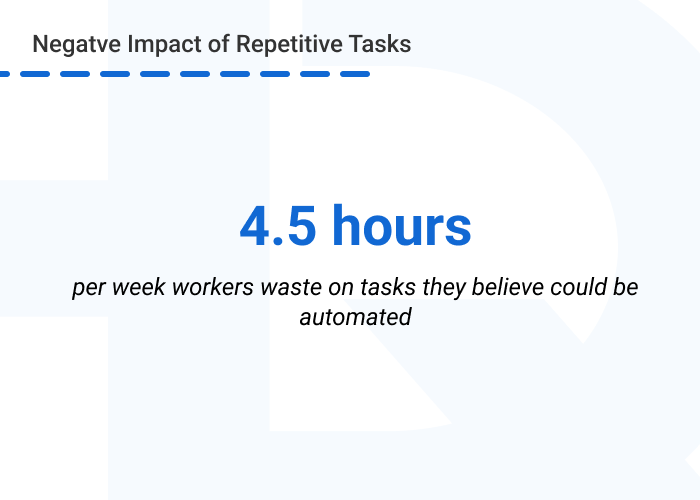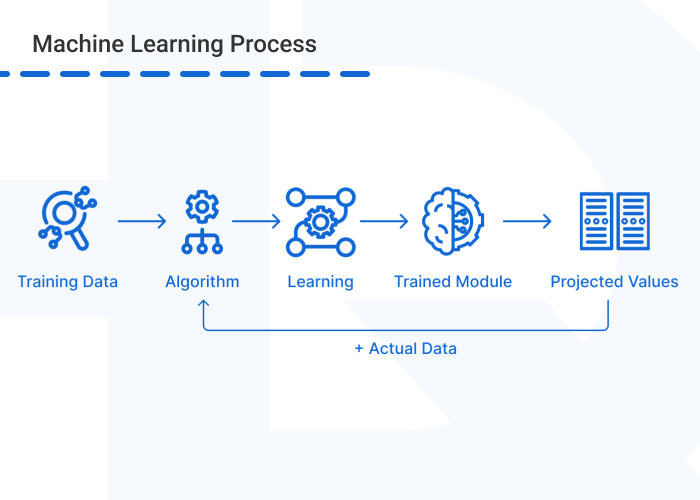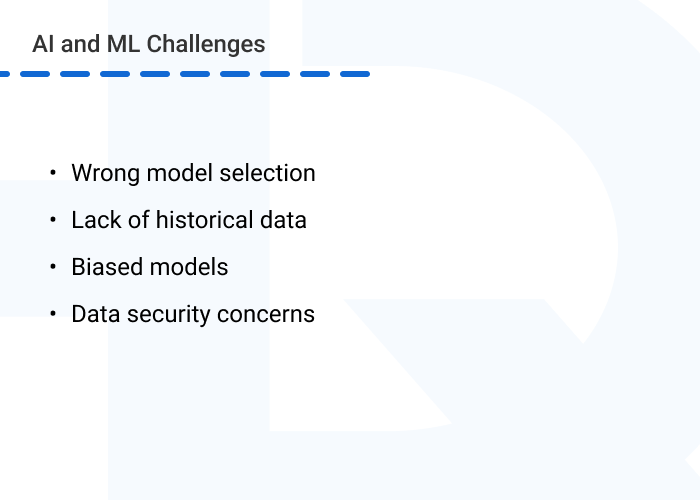The Role of Artificial Intelligence in Fintech
How Machine Learning (ML) is Impacting the Finance Industry
Challenges and Limitations of AI and ML for Financial Services
Artificial Intelligence (AI) and Machine Learning (ML) are currently hot topics across almost all industries, from manufacturing to marketing, fostering businesses to implement them for outstanding operational results.
For fintech, with its intricate and rapidly changing nature, implementing AI and ML is especially valuable. It can help organizations overcome some of their most difficult challenges, such as processing large amounts of data, cybersecurity issues, etc.
Having addressed most of these issues, such as streamlining data processing, while working with our clients at HQSoftware, in this in-depth guide we outlined how you can leverage ML and AI in fintech to truly benefit from the technology rather than merely wasting resources chasing trends.
The Role of Artificial Intelligence in Fintech
How Machine Learning (ML) is Impacting the Finance Industry
Challenges and Limitations of AI and ML for Financial Services
Fintech benefits from AI technology mainly when it comes to process automation, improving security, and customer experience. Let’s discuss these benefits in this section.
Repetitive manual tasks are gobblers of valuable time and resources within any organization. In fact, workers waste about 4.5 hours a week on tasks they believe could be automated. This not only reduces productivity and motivation but also introduces the risk of human errors.

To spare more of your employees’ valuable time for their core responsibilities, you can automate repetitive financial tasks, ranging from customer account maintenance to manual reconciliation, using Artificial Intelligence. The technology can also automate:
The more tasks are automated with AI technology in finance, the less manual intervention is required, streamlining operational efficiency.
This approach proved successful for one of our clients, a US-based provider of medicines covered by insurance companies.
Previously, all document processing was performed manually, leading to mistakes and slowing down operations. We implemented a Machine Learning model for document recognition and processing. It scans incoming documents and automatically extracts data required for accounting systems. Now, the system can process 20 files per minute compared to the previous 10-minute timeframe for a single document.
Want to boost your fintech solution with AI/ML? We’re ready to help!HQSoftware has a team of skilled professionals ready to tackle the project. Ask me!
Anna Halias
Business Development Manager
Credit card fraud, payment fraud, and many other frauds pose significant threats to your fintech business. More than 70% of fintech businesses lost about $500 million due to fraudulent activities in 2022.
As attackers continually advance their techniques and leverage emerging technologies to siphon funds, traditional security measures are no longer able to guarantee the highest security standards. The old tools experience shortcomings when it comes to:
Now let’s explore how fintech AI can help you overcome each of these challenges.
| Challenge | How Artificial Intelligence for fintech can help |
| Advanced behavior analysis | By analyzing vast amounts of historical positive and negative behavior data, AI can detect anomalies, such as atypical transaction patterns or unexpected data access, identifying potential security breaches early on. |
| Implementing the latest encryption standards | By assessing current and new encryption protocols, AI updates the encryption methods of your platform, reducing the risk of data breaches. |
| Compliance check | AI can identify updates to regulatory texts and assess compliance status quickly, ensuring that you remain compliant with evolving regulations without manual oversight. |
| Real-time transaction monitoring | When AI identifies patterns indicative of fraudulent activities, it triggers immediate preventive actions to block fraudulent transactions in real time. |
| Third-party risk assessment | AI can assess factors such as financial stability, cybersecurity posture, and regulatory compliance of third-party systems to eliminate vulnerabilities across the entire fintech ecosystem. |
Also, AI technology in finance can reduce the number of false positives and identify previously unseen threats, not to mention offering significant cost savings.
For example, if all UK banks implemented Mastercard’s Consumer Fraud Risk tool, as TSB bank already did, and mirrored its performance, they could collectively save around $125 million per year on scam payments.

One more benefit is that high-quality Artificial Intelligence fintech cybersecurity solutions are lightweight, so they don’t compromise the performance of your fintech system.
However, while AI excels in automated fraud detection, such as account turnover or credential stuffing, human-generated frauds like phishing or social engineering are nearly impossible for AI to track. So, it’s still up to you to properly educate your employees on security measures and enforce them.
To ensure ongoing success, modern fintech companies need to meet rapidly rising customer demand. For example, 71% of end-users expect businesses to offer personalized interaction and services.
With AI in fintech, you can meet these expectations by offering AI-driven chatbots and virtual assistants. Such tools can provide customers with information about their financial transactions, offer 24/7 support, or even carry out deals on behalf of the customer, increasing their satisfaction.

When it comes to your fintech business, chatbots can help you:
Personalized recommendations are another crucial field where Artificial Intelligence fintech features are indispensable. By analyzing huge amounts of customer data, including financial situation, behavior, habits, financial goals, and even social media activity, AI can offer customers personalized recommendations on:
For example, the AI-powered virtual assistant Erica has helped Bank of America increase revenue by 19% by offering personalized recommendations on bank products and services during conversations with customers.
To deliver all these capabilities, Artificial Intelligence has incorporated several technologies, including Machine Learning, Natural Language Processing (NLP), computer vision, etc. While these technologies may seem similar, they are responsible for different types of applications and features.
Let’s delve into the most common technology and explore promising ML use cases in finance.
With its ability to process and understand a huge amount of data, advanced Machine Learning in finance can enhance credit scoring, enable algorithmic trading, and ensure data-driven forecasts.
In the field where businesses speak in numbers, relying on accurate data and forecasts when making decisions are crucial for success. The main problem is that trends depend on many dynamic parameters that affect the business landscape differently, making accurate forecasting extremely challenging.
Machine Learning in finance offers you unparalleled predictive capabilities, as ML algorithms are flexible and can adapt to changing variables, such as market volatility.
Initially, Machine Learning algorithms make predictions based on historical data. Yet, to enhance accuracy, the algorithm continually compares its predictions with actual data during operations. Any disparities prompt the algorithm to adapt its settings, ensuring the delivery of reliable data.

In this way, you can make data-driven decisions in the following fields:
For example, by implementing ML to process and predict risks, German-based insurance company Allianz significantly improved risk management and sped up processing time, especially in underwriting, which is the next ML application in finance in this article.
Deciding whether a client qualifies for a loan and determining its size manually introduces a risk of human mistakes, potentially leading to a wrong loan decision and financial losses.
Advanced Machine Learning in finance can help automate and speed up credit scoring, going beyond traditional credit history analysis and evaluating an amount of data that exceeds human capacity.
By identifying correlations between apparently unrelated factors, such as geographic location, social connection, payment history, or behavioral biometrics, ML empowers you to make insightful credit decisions. It decreases the likelihood of costly human mistakes and reduces the human resources required for the underwriting process.
For example, by implementing ML for credit scoring, American Express can provide loan eligibility information to business owners within several minutes, a significant improvement compared to the previous 30-day timeframe.
Around 80% of trades on the developed markets are algorithmic, meaning that trades are carried out according to predetermined parameters and mathematical models. The main disadvantage of this is that such models are usually static and can’t quickly adjust to changing market conditions.
Meanwhile, the trading landscape is very dynamic, where even seemingly insignificant factors, such as a post on social media, can rapidly change market situations. To maximize profit, algorithmic trading models should be flexible, just as Machine Learning allows.
With ML for algorithmic trading, you can build trading models that use not only historical but also current data, enabling quick and profitable decision-making.
For example, Machine Learning can analyze textual data, such as news or posts, and forecast how it might influence the current situation within seconds, providing you with valuable insights.
So, with ML algorithmic trading you will be able to:
Despite the value AI and ML applications in finance bring to your business, the technologies can sometimes become a pain due to some typical challenges of Artificial Intelligence and Machine Learning in finance.
Among the biggest challenges of implementing ML and AI technologies in finance are:

We’ve discussed ways of overcoming all these challenges in a separate article. However, if we were to highlight an all-in-one solution, we would suggest beginning with choosing a reliable fintech software development company.
Igor Kunovskiy
Lead Software Engineer
at HQSoftwareExperienced software engineers have in their arsenal specialized techniques and technical metrics with which they can, first, select the right AI model for your needs, and second, avoid model overtraining and guarantee effective results.
Our team at HQSoftware possesses these and other skills, such as an understanding of the needs of the fintech industry, how to address AI data security issues, and availability with a wide range of technologies. We’ve worked with AI/ML in various industries and are ready to ensure your business remains competitive in the future realities.
Artificial Intelligence for fintech isn’t just a passing trend; it’s a powerful technology that can boost the revenue of financial organizations by 34%.
While fintech businesses leverage technologies such as mobile platforms and IoT to gather extensive data, the AI/ML capabilities in Data Science are crucial for processing and analyzing it. This will play a crucial role in extracting meaningful insights and enhancing decision-making processes.
We can also expect that tools such as ChatGPT won’t be overlooked in the financial landscape, revolutionizing financial planning, virtual assistants, risk management, and more.
For example, FlexTrade implemented ChatGPT to simplify the interaction between traders and its trading platform, enabling users to quickly receive reports and gain awareness of current orders using natural language.
Igor Kunovskiy
Lead Software Engineer
at HQSoftwareDespite the potential of AI in fintech, some companies, particularly larger corporations, may still approach this technology cautiously due to traditional business ideologies and concerns about security. However, I think the future of AI in finance is bright, as it opens up innovation and efficiency opportunities for the financial sector.
Virtual assistants, fraud detection, algorithmic trading — these and more AI/ML use cases in finance can enrich your business. With these advanced technologies, you can benefit from:
Contact us to learn how HQSoftware can bring all these benefits to your fintech business.

Head of Production
To ensure the outstanding quality of HQSoftware’s solutions and services, I took the position of Head of Production and manager of the Quality Assurance department. Turn to me with any questions regarding our tech expertise.
We are open to seeing your business needs and determining the best solution. Complete this form, and receive a free personalized proposal from your dedicated manager.

Sergei Vardomatski
Founder